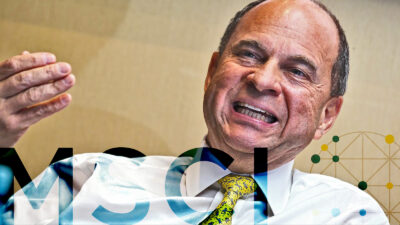UBS advises clients to reduce Aussie equities and cash
(Pictured: David Sokulsky)
For much of this year UBS Wealth Management has been advising Australian clients – accounting for more than $20 billion with the firm – to reduce their Australian equities exposures and shift money into the US market. UBS is continuing to do so following its outlook for next year.
David Sokulsky, the CIO for Wealth Management in Australia, says that many clients followed the advice and should be pleased with the results, getting the double benefit of relative outperformance of the US market and declining Aussie dollar.
He said at the release of the 2015 global forecast for UBS last week that the US market remained the standout investment destination through its “sustainable” recovery, compared with Europe, China and Australia, each of which faced different challenges. The main risk for the US, which Sokulsky believes is remote, is inflation. All other signals, such as production, employment and housing, were good or very good. With housing, he said, UBS would like it to be a little stronger but it was still recovering well.
Sokulsky joined UBS in Sydney this year after 10 years in the Americas in New York and the Virgin Islands with Macquarie Bank and then global macro hedge fund manager Denali Asset Management.
He said that diversification would be more important during 2015 because of the different stages of recovery around the world.
“Being heavily overweight to Australian equities is expected to be sub-optimal given the environment we are moving into,” he said. “This is particularly true if investors also have a heavy allocation to Australian property… When looking to diversify, the US is expected to represent the best investment opportunity. [US] equities and high-yield credit should be targeted for tactical overweights.”
UBS believes that the Aussie dollar has a little further to fall, but the gains for international investors may not be as great from that as they were this year. Sokulsky said that the main driver for investing more in the US should not be the likelihood of further declines in our currency but rather the fundamentals for the US market.
UBS is advising not only a reduction in the relative weights to Aussie equities but also a reduction in the historically high cash balances held by its clients, many of whom are high-net-worth investors who have benefitted from the domestic share market in recent years.
It was also a good time to increase exposures to alternatives, Sokulsky said. “Australians have been slow adopters of hedge funds and have historically focused on domestic beta exposure. However, now is the time to add alternative investments and benefit from their attractive risk-adjusted returns, given that 2015 is expected to be a lower-return, lower-yield environment for traditional asset classes.”
He favours equity market-neutral strategies, where the products do not involve long lock-ups, to reduce some of the drag on returns which excessive cash would otherwise lean to.








